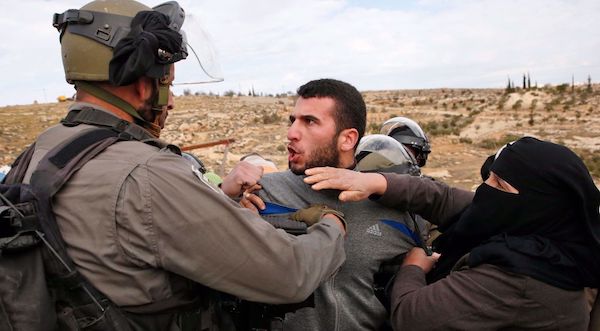
Residents scuffle with Israeli troops following the demolition of a Palestinian home which Israeli authorities said was built without a permit in the village of Al-Dirat near the West Bank town of Hebron on January 16, 2020. (Photo by AFP)
The foundation of the Quds-usurping regime of Israel has been based on bloodshed and killing, says a political analyst from Canada, adding that whatever crimes Tel Aviv commits in the Middle East region is due to the green light and immunity it enjoys due to the backing of its allies.
Firas al-Najim, manager of Canadian Defenders for Human Rights from Ottawa, made the remarks during a Thursday edition of Press TVís The Debate program while commenting on the significance of International Quds Day and why some Muslim nations intend to normalize ties with Israel instead of advocating the Palestinian cause.
International Quds Day, celebrated on the last Friday of the Muslim fasting month of Ramadan, is a legacy of the late founder of the Islamic Republic of Iran, Imam Khomeini, who is revered as a spiritual leader by Muslims across the world.
Muslims, non-Muslims and freedom-seeking people worldwide have held massive rallies in the past couple of decades to mark the major occasion which reminds the world of the need to restore the rights of the Palestinians, infringed upon by the Tel Aviv regime over many decades.
The event is viewed as an opportunity for all pro-Palestine people to express their indignation at the apartheid regime of Israel, which has occupied Palestinian territories since the mid 20th century.
"The Israelis and the Zionist regime have a green light to do whatever they want; this is why they keep trampling on human rights and all international laws because nobody is penalizing them, nobody is imposing any sanctions on them, there is no punishment whatsoever," Najim told Press TV.
"The Zionistís lobbies have a lot of money, a lot of influence, a lot of corporations. There are a lot of politicians that they have in their hands and they influence foreign policy of many governments they put hands on," he added.
"The Israeli regime is based on bloodshed and killing; they think that this is their chosen land they are the chosen people and this is their chosen battle and they have to do whatever it is to control fully," Najim underlined. "[When] we see the human rights record of the Israeli regime, we see that itís very black, itís very bloody and I think that the end of the Zionist regime is coming near."
This yearís Quds Day coincides with Israeli Prime Minister Benjamin Netanyahuís push to annex Palestinian lands in the occupied West Bank.
The new land grab project is a by-product of US President Donald Trumpís so-called ‘deal of the centuryí peace initiative, which blatantly undermines the Palestine right to statehood in exchange for vague promises of basic economic opportunities.
Iran argues the Palestinians have no option but to continue with their struggle until the usurpers give up and allow them to decide their destiny in a referendum. Conversely, a number of Arab states such as Saudi Arabia, the UAE and Egypt have opted to normalize their ties with Tel Aviv instead of advocating the Palestinian cause.
Wafik Moustafa, chairman of the Conservative Arab Network from London, was the other panelist invited to The Debate program, who accentuated the right of return for Palestinians and its denial by the Israeli regime.
"The right of return is certainly a right that should be supported; there is no doubt about that, and people who have deeds and plans they should support their rights internationally," Moustafa said.
"All the Arab countries in the Middle East are using the Palestinian issue as a football but in real fact you could see no real movement thatís why I think we need to be pragmatic and start moving toward a practical solution," he added.
Trumpís highly provocative scheme, which further denies the right of return for Palestinian refugees to their homeland, is also in complete disregard of UN Security Council resolutions and has been rejected by the vast majority of the international community.
Palestinians want the West Bank as part of a future independent Palestinian state, with East Jerusalem, al-Quds, as its capital. But Israelís aggressive settlement expansion and annexation plans have dealt a serious blow to any prospects of peace.
The last round of Israeli-Palestinian talks collapsed in 2014. Among the major sticking points in those negotiations was Israelís continued expansion of settlements in Palestinian territories.
More than 600,000 Israelis live in over 230 settlements built since the 1967 Israeli occupation of the Palestinian territories of the West Bank and East Jerusalem, al-Quds.
SOURCE: PRESS TV
LINK: https://www.ansarpress.com/english/17804
TAGS:






























 online news tv
online news tv




